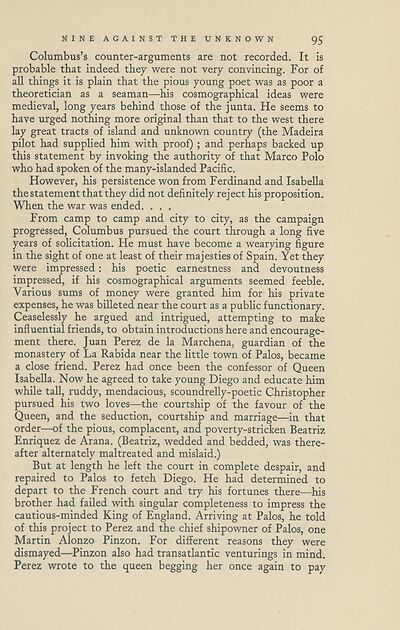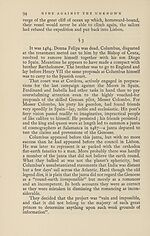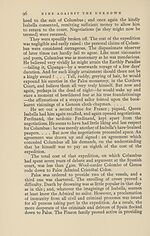Nine against the unknown
(111)
Download files
Complete book:
Individual page:
Thumbnail gallery: Grid view | List view

NINE AGAINST THE UNKNOWN
95
Columbus’s counter-arguments are not recorded. It is
probable that indeed they were not very convincing. For of
all things it is plain that the pious young poet was as poor a
theoretician as a seaman—his cosmographical ideas were
medieval, long years behind those of the junta. He seems to
have urged nothing more original than that to the west there
lay great tracts of island and unknown country (the Madeira
pilot had supplied him with proof) ; and perhaps backed up
this statement by invoking the authority of that Marco Polo
who had spoken of the many-islanded Pacific.
However, his persistence won from Ferdinand and Isabella
the statement that they did not definitely reject his proposition.
When the war was ended. . . .
From camp to camp and city to city, as the campaign
progressed, Columbus pursued the court through a long five
years of solicitation. He must have become a wearying figure
in the sight of one at least of their majesties of Spain. Yet they
were impressed: his poetic earnestness and devoutness
impressed, if his cosmographical arguments seemed feeble.
Various sums of money were granted him for his private
expenses, he was billeted near the court as a public functionary.
Ceaselessly he argued and intrigued, attempting to make
influential friends, to obtain introductions here and encourage¬
ment there. Juan Perez de la Marchena, guardian of the
monastery of La Rabida near the little town of Palos, became
a close friend. Perez had once been the confessor of Queen
Isabella. Now he agreed to take young Diego and educate him
while tall, ruddy, mendacious, scoundrelly-poetic Christopher
pursued his two loves—the courtship of the favour of the
Queen, and the seduction, courtship and marriage—in that
order—of the pious, complacent, and poverty-stricken Beatriz
Enriquez de Arana. (Beatriz, wedded and bedded, was there¬
after alternately maltreated and mislaid.)
But at length he left the court in complete despair, and
repaired to Palos to fetch Diego. He had determined to
depart to the French court and try his fortunes there—his
brother had failed with singular completeness to impress the
cautious-minded King of England. Arriving at Palos, he told
of this project to Perez and the chief shipowner of Palos, one
Martin Alonzo Pinzon. For different reasons they were
dismayed—Pinzon also had transatlantic venturings in mind.
Perez wrote to the queen begging her once again to pay
95
Columbus’s counter-arguments are not recorded. It is
probable that indeed they were not very convincing. For of
all things it is plain that the pious young poet was as poor a
theoretician as a seaman—his cosmographical ideas were
medieval, long years behind those of the junta. He seems to
have urged nothing more original than that to the west there
lay great tracts of island and unknown country (the Madeira
pilot had supplied him with proof) ; and perhaps backed up
this statement by invoking the authority of that Marco Polo
who had spoken of the many-islanded Pacific.
However, his persistence won from Ferdinand and Isabella
the statement that they did not definitely reject his proposition.
When the war was ended. . . .
From camp to camp and city to city, as the campaign
progressed, Columbus pursued the court through a long five
years of solicitation. He must have become a wearying figure
in the sight of one at least of their majesties of Spain. Yet they
were impressed: his poetic earnestness and devoutness
impressed, if his cosmographical arguments seemed feeble.
Various sums of money were granted him for his private
expenses, he was billeted near the court as a public functionary.
Ceaselessly he argued and intrigued, attempting to make
influential friends, to obtain introductions here and encourage¬
ment there. Juan Perez de la Marchena, guardian of the
monastery of La Rabida near the little town of Palos, became
a close friend. Perez had once been the confessor of Queen
Isabella. Now he agreed to take young Diego and educate him
while tall, ruddy, mendacious, scoundrelly-poetic Christopher
pursued his two loves—the courtship of the favour of the
Queen, and the seduction, courtship and marriage—in that
order—of the pious, complacent, and poverty-stricken Beatriz
Enriquez de Arana. (Beatriz, wedded and bedded, was there¬
after alternately maltreated and mislaid.)
But at length he left the court in complete despair, and
repaired to Palos to fetch Diego. He had determined to
depart to the French court and try his fortunes there—his
brother had failed with singular completeness to impress the
cautious-minded King of England. Arriving at Palos, he told
of this project to Perez and the chief shipowner of Palos, one
Martin Alonzo Pinzon. For different reasons they were
dismayed—Pinzon also had transatlantic venturings in mind.
Perez wrote to the queen begging her once again to pay
Set display mode to:
![]() Universal Viewer |
Universal Viewer | ![]() Mirador |
Large image | Transcription
Mirador |
Large image | Transcription
Images and transcriptions on this page, including medium image downloads, may be used under the Creative Commons Attribution 4.0 International Licence unless otherwise stated. ![]()
| The books of Lewis Grassic Gibbon > Nine against the unknown > (111) |
|---|
| Permanent URL | https://digital.nls.uk/205219385 |
|---|
| Description | Sixteen books written by Lewis Grassic Gibbon (1901-1935), regarded as the most important Scottish prose writer of the early 20th century. All were published in the last seven years of his life, mostly under his real name, James Leslie Mitchell. They include two works of science fiction, non-fiction works on exploration, short stories set in Egypt, a novel about Spartacus, and the classic 'Scots Quair' trilogy which includes 'Sunset Song'. Mitchell's first book 'Hanno, or the future of exploration' (1928) is rare and has never been republished. |
|---|---|
| Additional NLS resources: |
|

